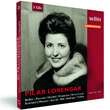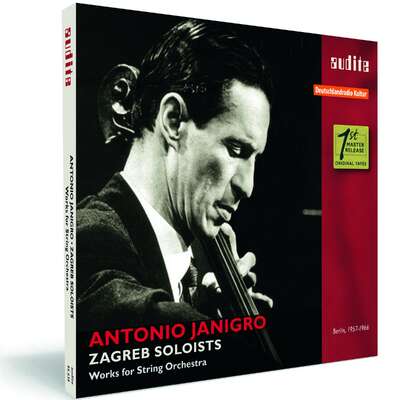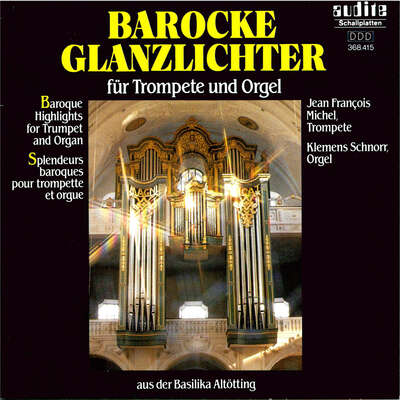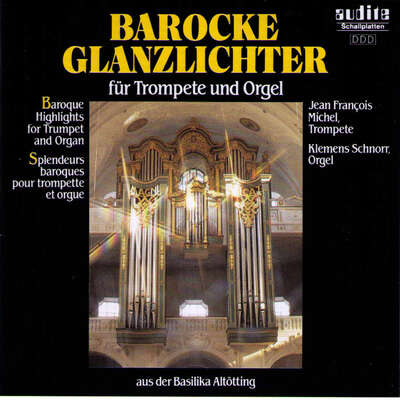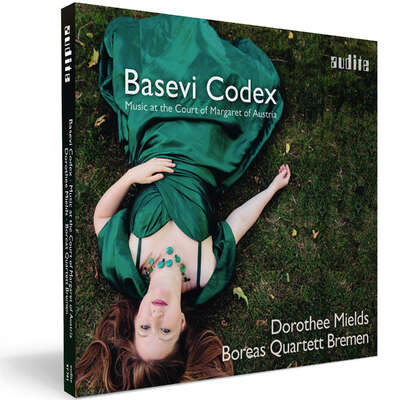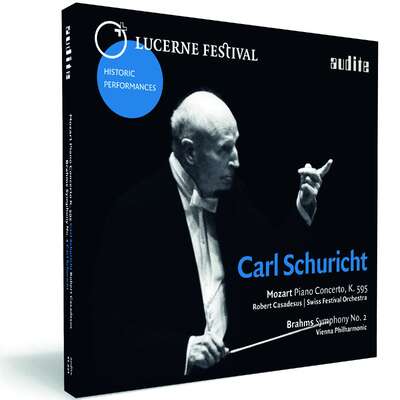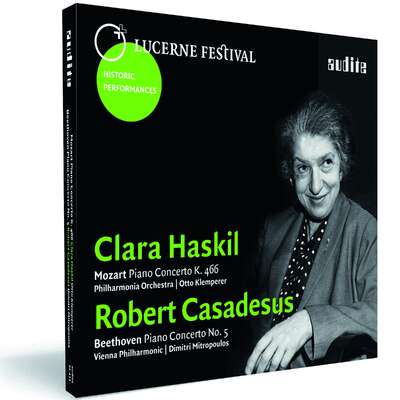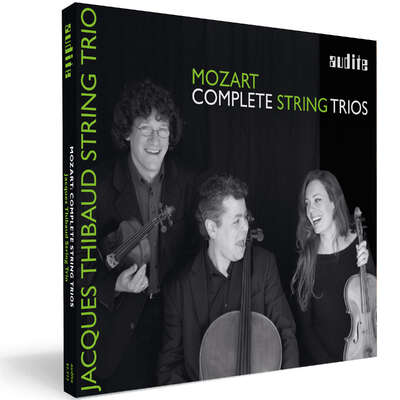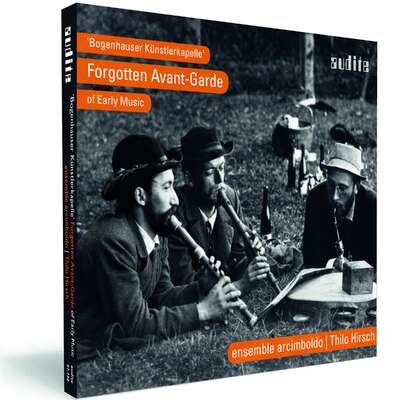
Light, brilliance, intimacy and infallible purity of tone are united in the voice of the Spanish soprano Pilar Lorengar – qualities that predestined her for youthfully lyrical and dramatic soprano roles, especially in the German, Italian and French repertoires. In studio and live recordings from 1959 to 1962 alongside standards, she pays homage here to the musical traditions of her homeland.more
Berliner Philharmoniker | RIAS-Orchester | RIAS Kammerchor | Radio-Symphonie-Orchester Berlin
Arthur Rother | Ferdinand Liva | Fried Walter
"[...] if you want to revel in the beauty and freshness of one of the postwar era’s most lovable soprano voices in its youthful prime, this is a set to head for." (Opera)
Track List
Details
| Pilar Lorengar: A portrait in live and studio recordings from 1959-1962 | |
| article number: | 21.420 |
|---|---|
| EAN barcode: | 4022143214201 |
| price group: | CV |
| release date: | 6. June 2014 |
| total time: | 177 min. |
Bonus Material
Informationen
Pilar Lorengar, the Spanish singer whose adopted home city was Berlin, especially owed her worldwide but unobtrusive fame to the operatic stage. She was famous for a repertoire ranging from the youthful heroines of Mozart, the youthful dramatic heroines of Verdi and Puccini to tragic girlish figures such as Tchaikovsky's Tatiana and Janáček's Jenůfa. The three CDs of the present compilation with arias and Lieder contain sound documents from the singer's first Berlin years, studio and live recordings made between 1959 and 1962. Lorengar shows herself from a rather unusual side in them, both in the field of opera and in the Lieder: she is not heard here in her established Mozart role of Donna Elvira, but as Donna Anna; in addition, she can be heard singing repertoire that was unusual for her, e.g. the prayer „Casta Diva" from Bellini's Norma, „Piangerò la sorte mia" from Handel's Cleopatra and a Handel cantata, an aria from a Scarlatti opera, the „Ernani, involiami" of Elvira from Verdi's early opera „Ernani" and the role of Rosario from the opera „Goyescas" by Granados. The Mozart singer also reveals herself here to be an agreeable Lied singer; where she already brings her sensitivity for this genre into play with Mozart, she then enriches her programme with the inclusion of a love lament by Bellini and Lied-like aria sketches - four canzonette by the young Verdi. With two thirds of this anthology, Pilar Lorengar then covers an area that pays homage to the musical traditions of her homeland. As a young schoolgirl in Madrid, she acquired extensive theatrical practice and presence in the music cafes and the zarzuela theatre. In her contributions to the present release, she unfolds a panorama of Spanish music history extending over five centuries, ranging from the vocal art of the 16th-century vihuelistas to the folklore collections and adaptations of Federico García Lorca. The modern guitar is the legitimate successor to the time-honoured vihuela, and Siegfried Behrend is Pilar Lorengar's congenial partner in theseart songs.
This release is furnished with a "producer's comment" by producer Ludger Böckenhoff.
Reviews
Classica – le meilleur de la musique classique & de la hi-fi | n° 174 juillet-août 2015 | André Tubeuf | July 1, 2015
Archives Lyriques
De Elly Ameling à Pilar Lorengar, honneur ce mois-ci à quelques grandes dames du chant
La voix blonde, ravissante, divine dans Mimi, Pamina, Butterfly est un peu perdue dans Norma. Mais tout ce qui est espagnol est merveilleux, et la Cleopatra de Haendel sublime.Mehr lesen
Muzyka21 | kwiecień 2015 | Jacek Chodorowski | April 1, 2015
Artystka jasnością i młodzieńczym brzmieniem swego głosu fascynowała publiczność i krytyków.Mehr lesen
American Record Guide | 12/2/2014 | Richard Sininger | December 2, 2014
The Spanish soprano Pilar Lorengar (1928–96) had a big international career including the Met, San Francisco, and Chicago in the US but called theMehr lesen
The first disc contains 11 arias, mostly very familiar. ‘Casta Diva’ from Norma is taken at the slowest tempo I have ever heard. We can’t know if the tempo is the fault of the conductor or the soprano, but the chorus singing behind her sounds as if they may fall asleep. But the tempo picks up in the cabaletta, and she is up to the coloratura demands. Liu’s ‘Signore, Ascolta’ comes off very well, though the soprano ignores the customary pianissimo on the final note. Her singing of ‘Un Bel Di’ and Mimi’s first aria are lovely, with the gleaming top notes Puccini requires. She includes ‘Non Mi Dir’ from Don Giovanni, perhaps the least effective selection here. She finds the coloratura rough going. Perhaps this tells us why she usually sang Donna Elvira instead of Donna Anna. Her account of Pamina’s ‘Ach, ich fühl’s’ is gorgeous, and she does well with Violetta’s Act I scena, except for a little unidiomatic Italian pronunciation in the fast final section.
The second disc is devoted to songs by Spanish composers of the late 19th and 20th centuries as well as a group of songs by Verdi. The Spanish songs (by Rodrigo, Nin, Leoz, Guridi, Granados, and Toldra) are unfailingly pleasant, melodic, and entertaining. The Rodrigo is played by an orchestra; the rest are accompanied by piano. Ms Lorengar is of course at home in the Spanish language and sings very well. In the Verdi songs one can hear hints of his operas.
The last disc, with guitar accompaniment, includes a few songs by Bellini, Mozart, and Handel as well as 20 Spanish songs, some by Renaissance composers and some collected by Federico Garcia Lorca. Again, all are tuneful and well sung. Some of the Lorca collection, Flamenco songs, are among the most enjoyable.
The collection comes with a booklet with the names and times of the songs, but no texts. The booklet gives a web site where the lyrics can be found, but I would much prefer having the texts with the recording.
Der neue Merker | Dezember 2014 | Dr. Ingobert Waltenberger | December 1, 2014 PILAR LORENGAR – 3 CD Porträt vom Label Audite in Zusammenarbeit mit Deutschlandradio Kultur veröffentlicht
Besser kann man diese Stücke nicht singen, glänzende Edelsteine im Fundus an historischen Aufnahmen. [...] Welches Licht in dieser Stimme steckt. Wenn die Sonne singen könnte, würde sie wohl wie Pilar Lorengar klingen.Mehr lesen
Kulimu | 40. Jg. 2014 Heft 2 | uwa | December 1, 2014
Besonders interessant und wertvoll ist diese CD-Box durch die Wiedergabe spanischen Liedguts der Komponisten Joaquin Rodrigo, Joaquin Nin, Granados, Eduardo Toldra, Guridi u. a. Ihre Zusammenarbeit mit dem Gitarristen Siegfried Behrend, mit dem sie spanische Renaissancelieder sowie von Federico Garcia Lorca gesammelte altspanische Lieder und Romanzen einspielte, zählt auch heute noch zu den herausragenden Dokumenten der Schallplattengeschichte. Ihr kultivierter Vortrag, ihre subtile Artikulation, dem hellhörigen, lebendigen Dialogisieren mit Behrend, der mit seinem feinfühligen Spiel Lorengar jederzeit ein musikalischer Partner im besten Wortsinne war, gilt als maßstabsetzend für nachfolgende Künstlergenerationen.Mehr lesen
klassik.com
| 22.11.2014 | Benjamin Künzel | November 22, 2014 | source: http://magazin.k...
Eine Spanierin in Berlin
Lorengar, Pilar singt – Werke von Bellini, Puccini, Händel u. a.
Dass beim Label Audite nun eine Box mit drei CDs erschienen ist, die vor allem die Anfangsjahre der Lorengar in Berlin dokumentieren, ist von besonderer Bedeutung. Denn inmitten dieser sorgfältig aufgearbeiteten Rundfunkbänder finden sich einige Arien, die man in keiner anderen bekannten Zusammenstellung mit Pilar Lorengar findet, und einige Partien, die von der Künstlerin nie auf der Bühne verkörpert wurden. Zudem erlebt der Hörer Lorengars unverwechselbare Stimme in all ihrer jugendlichen Schönheit.Mehr lesen
Diapason | N° 629 Novembre 2014 | Jean-Charles Hoffelé | November 1, 2014
Formée à l'école de la zarzuela, Pilar Lorengar aurait pu y rester cantonnée si très tôt elle n'avait inscrit à son répertoire quelques liederMehr lesen
En trois CD, Audite révèle les bandes berlinoises de ses premières années au Städtische. Herta KIust est au piano pour un bouquet espagnol incroyable de tenue, élégant jusque dans le plus populaire, mais aussi pour de rares mélodies de Verdi. La guitare de Siegfried Behrens s'invite dans quelques Kanzonen de Mozart, des Canciones antiguas où Lorengar captive autant que Los Angeles, se montre aussi plus simple, comme dans des Lorca subtilement calligraphiés.
Côté opéra, le portrait est quasi complet – manquent Elsa et Eva, abordées plus tard. Une esquisse de Traviata, un flamboyant «Ernani Involami» laissent deviner ses grands Verdi, et même si elle n'a pas le caractère d'une Norma son «Casta diva» célèbre une lune inquiétante. On admirera des premiers Puccini frémissants – sa Mimi restera inoubliable. Et celle qui fut toujours sur scène Elvira, chante ici «Crudel! Non mi dir»: pureté de la ligne jusque dans l'affliction. Quelle Donna Anna elle eût été!
International Record Review | November 2014 | Roger Pines | November 1, 2014
In an era full of superb lyric sopranos, Spain's Pilar Lorengar (1928-1996) stood out. She was special not only for the breadth of her repertoire,Mehr lesen
Depending on what recordings you listen to, your response to Lorengar depends to a great extent on your feelings regarding the degree of vibrato in a voice. It was, in fact, what put me off much of what Lorengar recorded in many of her best-known discs. Happily, though, in Audite's set (performances dating from 1959-62 by a singer still in her early thirties, after only a few years of stardom), not one of the 60 tracks is compromised by excessive vibrato. In these recordings, Lorengar's sound is not merely clear – it gleams (especially at the top, always Lorengar's greatest strength). Her singing invariably accentuates sincerity and femininity, with no reaching for effect. One warms to Lorengar's expressiveness immediately, and her appeal throughout the set remains irresistible.
Some surprises occur in the operatic material, which includes a few arias from roles not associated with Lorengar. One of those is Norma, whose 'Casta diva' begins the set. The RIAS Kammerchor sounds unexpectedly amateurish, and the Berlin Radio Symphony is conducted funereally by Arthur Rother. Lorengar, however, rises above all that, with fresh, shining sound, always sensitively used. The arias proceed with splendid performances of more suitable repertoire: Liu's 'Signore, ascolta!', with the Puccini style instinctively right and the characterization most touching; and Cleopatra's 'Piangero la sorte mia', where the thick, heavy orchestral contribution does not hinder emotion communicated through eloquent directness of address.
Excepting a cabaletta-Iess 'Ernani, involami' (another odd choice, lacking the necessary expansiveness), the other arias are treasurable. Among them are 'Un bel di' (perfection on the opening soft attack, missing only a bit more interpretative detail later); 'Mi chiamano Mimi' (utterly natural in delivery, with elegant portamento); 'Le Violette' from Scarlatti's Pirro e Demetrio (the essence of charm); and 'Ach, ich fühl's' (Pamina's misery emerges through expert control of the leaps and long phrases). Lorengar was a Donna Elvira, not a Donna Anna, but the latter's 'Non mi dir', although not as magisterial as some, shows no fear in the awkward tessitura of the first section or the tricky coloratura of the second. Violetta's scena has all the heart one could desire and absolute security throughout. Best of all is 'La Maja y el Ruisenor' from Granados's Goyescas; even if Montserrat Caballé's unearthly pianissimo and Victoria de los Angeles's plum-luscious richness don't figure in Lorengar's performance, she lets go gloriously above the stave when needed, and one can appreciate the unaffected sweetness that was entirely her own.
The other two discs recall a time not very long ago when a generation of Spanish divas – Lorengar, Caballé and Teresa Berganza – all felt a passionate compulsion to follow the example of their immediate predecessor, de los Angeles, by excelling in their native song literature. One cannot choose between these four singers, for all have something unforgettable to offer. Lorengar, like the others, thoroughly understands the value of simplicity of expression, and she haunts the listener with an innate sense of melancholy.
Rodrigo's four 'amorous madrigals' – sung here with orchestra – are beautifully done, with Lorengar's gaiety in the third of these being particularly delectable. She also responds strongly to the quintessentially Spanish rhythms and melisma of the final song of this group. Two Nin pieces (with Hertha Klust, one of the singer's early mentors, giving firm support at the piano) are done with Lorengar's usual charm.
The discs then move into material by lesser-known twentieth-century Spanish composers, Leoz and Guridi. The final three of the latter's Seis Canciones castellanas reveal a richness in the middle range seldom heard from Lorengar, and the sheer buoyancy of the third song makes it one of the gems of Audite's set. Few can match Caballé in Granados's Tonadillas, but Lorengar has a special way with these wonderful pieces, three of which are heard here. One especially relishes the knowingness of 'El Majo discreto', while another jewel of a song, 'El tra la la y el punteado', bursts with the confidence of the girl who knows that a certain young man will soon be hers. Three of Toldrà's Seis Canciones are finely done, with the warmth of 'Después que te conoci' making an especially fine impression.
Singing 11 Renaissance songs (with Siegfried Behrend's skilful guitar accompaniment aptly substituting for a vihuela), Lorengar is plaintive and intimate where required. She proves even more bewitching with the sunnier numbers – for example, 'De los álamos vengo', where the light voice seems to belong to a girl barely a day over 15.
The second disc ends with five Verdi songs. Lorengar is the ebullient gypsy to the life in 'La zingara', aptly soulful in 'Ad una stella' (decidedly second-drawer Verdi), delightful as the pert lover in Stornello and the liveliest of chimney-sweeps in 'Lo spazzacamino'. Greater variety of colour and dynamic is needed in 'Perduta ho la pace', Verdi's setting of the text we know better as 'Gretchen am Spinnrade'.
On the third disc Lorengar is rather too closely recorded for Bellini's Dolente immagine di Figlia mia, but this lament – again with Behrend's guitar finds her entirely comfortable in what is, in effect, mezzosoprano tessitura. Her purity of tone enhances four Mozart songs, of which the finest is a ravishing Ridente la calma. A real rarity, Handel's cantata of 1707 Nò se emendará jamás, with Richard Klemm's viola da gamba joining Lorengar and Behrend, gives one further evidence (following the Giulio Cesare aria on the first disc) for regret that this composer did not figure more prominently in Lorengar's career.
The set ends with nine of the Old Spanish Songs and Romances collected by Federico Garcia Lorca (Behrend is once again a strong partner). Like the Renaissance material, they are best listened to a few at a time – I'd say the same thing of anyone singing them but individually they can be savoured for Lorengar's superb breath control. In several of these songs more smoulderingly seductive tone can be heard from the marvellous Berganza, but Lorengar is often even more vivid in her textual delivery. Her infectious joy in singing gives immense pleasure in 'Las reyes de la baraja', one of the set's major highlights.
Audite's booklet offers an essay providing not only details of Lorengar's career but also much-needed information on some of the more obscure material heard here. Texts are available on Audite's website.
Given the significant gaps in Lorengar's commercial discography, this set can be warmly welcomed by all who cherish the memory of this captivating artist, still greatly missed.
Scherzo | Octobre 2014 | Joaquín Martin de Sagarmínaga | October 1, 2014 Políglota y Enterradora
Tenía esta soprano una voz Iimpia y clara, que brillaba incluso en el silencio, dejando tras de sí una estela argentina. Como intérprete, al igual que algunos cantantes centroeuropeos, era a la vez efusiva y musical, y su canto, muy centrado, jamás equivocaba la brújula del oyente.Mehr lesen
Deutschlandfunk | Sendereihe: Historische Aufnahmen, 22.05 – 22.50 Uhr | Kirsten Liese | September 25, 2014
Die Sopranistin Pilar Lorengar
Perlmutt schimmerndes Timbre
Sie verkörperte sowohl jugendliche Heldinnen wie Mozarts Pamina, Fiordiligi oder Donna Elvira als auch jugendlich dramatische Heroinen bei Verdi undMehr lesen
Die 1928 in Saragossa geborene Spanierin wirkte viele Jahrzehnte als festes Ensemblemitglied an der Deutschen Oper Berlin und sang dort zahllose höchst unterschiedliche Rollen. Ihr warmes, unverkennbares Timbre und die große Leuchtkraft ihrer Stimme prädestinierten sie für diese Partien. Diese Sendung stellt die 1996 verstorbene Sopranistin Pilar Lorengar jedoch nicht allein in ausgewählten Paraderollen vor, sondern präsentiert in neu veröffentlichten Aufnahmen auch weniger Typisches wie Arien von Bellini und Händel sowie aus dem spanischen Repertoire.
Stereoplay | 09/2014 (September 2014) | Voigt | September 1, 2014 Bienvenida! RIAS-Aufnahmen mit Pilar Lorengar
Aber es gibt eben auch Konstanten wie Pilar Lorengar. Man hört sie heute mit derselben Bewunderung und Liebe wie vor Jahrzehnten, aber mit zunehmendem Respekt vor der künstlerischen Leistung.Mehr lesen
Opera | September 2014 | Max Loppert | September 1, 2014
[...] if you want to revel in the beauty and freshness of one of the postwar era’s most lovable soprano voices in its youthful prime, this is a set to head for.Mehr lesen
Mitteldeutscher Rundfunk | MDR FIGARO | Take 5 | 04.08.2014 | 18:05-19:00 Uhr | Beatrice Schwartner | August 4, 2014 | source: http://www.mdr.d... BROADCAST CD-Empfehlung
Mit welch überirdisch schöner Stimme sie zwischen den Emotionen wechselt, wie sonnenhell ihr Sopran scheint, wie natürlich ihr (selbstredend) die spanischen Lieder gelingen, genauso aber auch die Barock-Stücke, all das ist nicht weniger als zum Niederknien.Mehr lesen
Tip - Berliner Stadtmagazin | 01.08.2014 | KLK | August 1, 2014 Pilar Lorengar: Frühe Arien und Lieder (Audite)
Sie sind eine Sensation an strauchelndem Liebreiz, Goldtimbre und fragiler Dramatik von Mozart bis Puccini, Händel bis Rodrigo. Zum Hinschmelzen.Mehr lesen
Der Tagesspiegel | 22.07.2014 | Frederik Hanssen | July 22, 2014
Klassik-CD der Woche: Pilar Lorengar
Spanische Nächte
Die Norma wie auch „Piangerò la sorte mia“ aus Händels „Giulio Cesare“ meistert sie mit Eleganz, jugendlicher Strahlkraft und schier endlosem AtemMehr lesen
RBB Kulturradio | Mi 02.07.2014 | Kai Luehrs-Kaiser | July 2, 2014
Pilar Lorengar singt Arien und Lieder
Werke der frühen Jahre – ein Grund zum Schwärmen
Zu den umschwärmtesten Publikumslieblingen im West-Berlin mindestens der 60er bis 80er Jahre gehörte die spanische Sopranistin Pilar Lorengar (1928Mehr lesen
Eine Entdeckung
In ihren frühen, jetzt erstmals auf CD erscheinenden und allesamt in Berlin entstandenen Aufnahmen der späten 50er und frühen 60er Jahre stellt man indes betroffen fest, dass es sich bei Lorengar bei weitem nicht nur um das Berliner Lokalgewächs handelte, als welches sie von der Schallplattenindustrie vielfach ignoriert wurde. Sondern – besonders in diesen frühen Aufnahmen – um eine der schönsten Stimmen auf Schallplatte überhaupt.
Dass ihr die Gratwanderung zwischen Lyrik und Dramatik, Verletzlichkeit und Emphase so unvergleichlich gelang, lag gewiss auch an dem spanischen Temperament, welchem im Klang nicht der geringste Anflug von Bittermandeln eigen war. Die Stimme flutete vielmehr überirdisch und scheinbar grenzenlos. Was sich live noch lange Jahre bestätigen ließ. (Lorengar verabschiedete sich an der Deutschen Oper erst 1991.)
Hinreißend
In Arien und Liedern von Bellini, Puccini, Händel, Granados, Verdi, Leoz, Scarlatti, Mozart, Guridi, Nin, Rodrigo, Toldrà u.a. lässt sich jetzt die gesamte Bandbreite dieser hinreißenden Sängerin nacherleben. Grund zum Schwärmen hat man nach diesen Aufnahmen mehr denn je.
Gramofon | 2014. június 28., szombat | Zay Balázs | June 28, 2014 Berlin hatvan körül
A stuttgarti Audite cég több mint negyven éve működik aMehr lesen
http://theaterpur.net | Juni 2014 | Christoph Zimmermann | June 1, 2014 Tenorales Gruppenbild mit Damen
Pilar Lorengars klares, sonnenhelles Organ lässt nirgends falsche Sentimentalität aufkommen. [...] Neuerlich bezaubert die Natürlichkeit der Darstellung ohne ein demonstratives Ausstellen vokaler Raffinessen.Mehr lesen
Das Opernglas | Juni 2014 | J. Gahre | June 1, 2014 CD News
Ihre Stimme [strahlt] in diesen um 1960 gemachten Aufnahmen Wärme und Weiblichkeit aus, die den modernen Hörer durchaus gefangen nehmen können.Mehr lesen
operafresh.blogspot.de | Tuesday, May 20, 2014 | May 20, 2014 Pilar Lorengar Live and Studio Recordings 1959-1962 Berlin
In addition to the live opera recordings on this release, is the famous studio recording of songs with guitar featuring Siegfried Behrend available for the first time on CD outside of Japan.Mehr lesen
The Epoch Times | August 11, 2014 | Barry Bassis Remembering One of Spain’s Leading Sopranos: Pilar Lorengar
Lorengar had a creamy soprano and a distinctive vibrato, which is pleasing to my ears [...]. Her voice is strikingly beautiful and she takes great care to project the text, whether she plays a Druid queen or a shy seamstress.Mehr lesen
News
Archives Lyriques
Bardzo dobrze się stało, iż niemieckie radio (Deutschlandradio Kultur)...
The Spanish soprano Pilar Lorengar (1928–96) had a big international career...
Die spanische Sopranistin Pilar Lorengar, welche sich 1991 als Tosca von ihrem...
PILAR LORENGAR – 3 CD Porträt vom Label Audite in Zusammenarbeit mit Deutschlandradio Kultur veröffentlicht
In an era full of superb lyric sopranos, Spain's Pilar Lorengar (1928-1996)...
Formée à l'école de la zarzuela, Pilar Lorengar aurait pu y rester cantonnée...
Audite, whose mission is the digging out and publication of recordings from the...
Remembering One of Spain’s Leading Sopranos: Pilar Lorengar
Pilar Lorengar: Frühe Arien und Lieder (Audite)
Pilar Lorengar Live and Studio Recordings 1959-1962 Berlin
